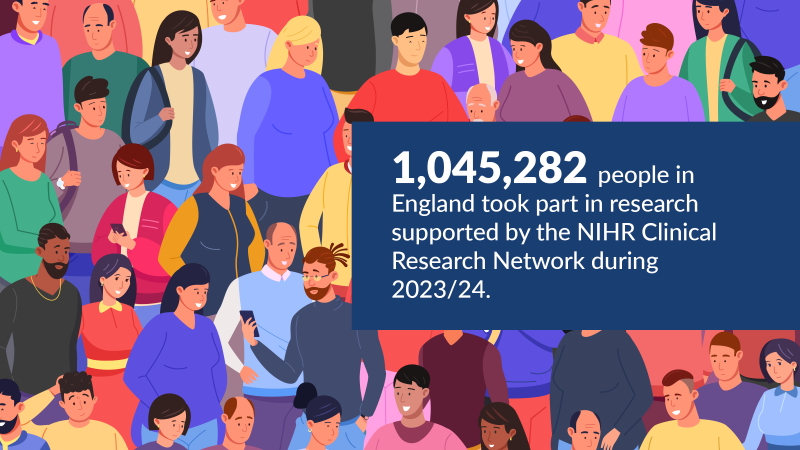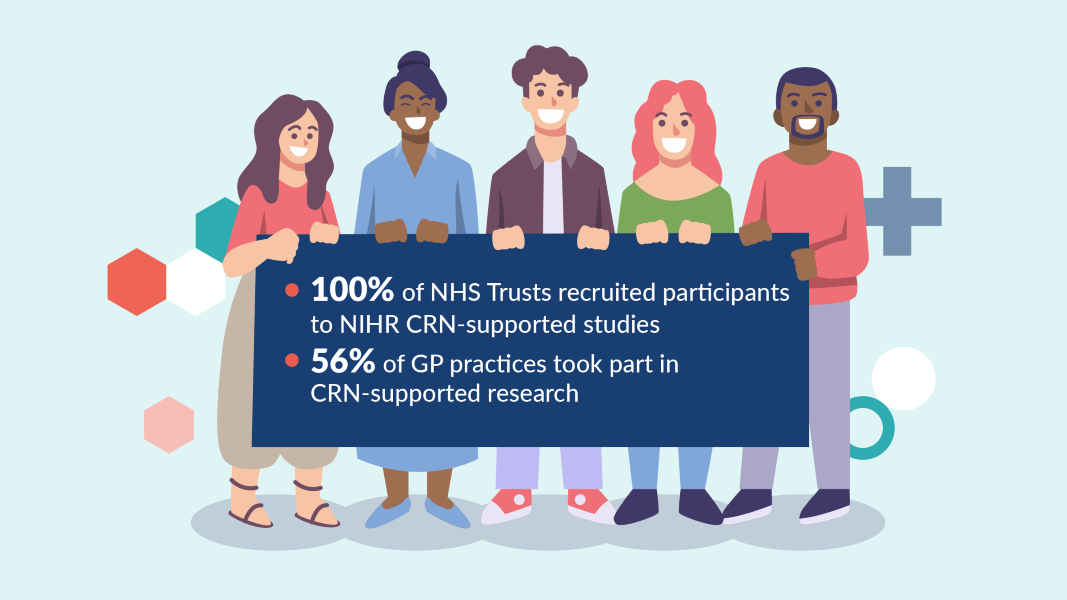Annual Statistics

Building on success
In the last year, we have seen another success story for clinical research, with 1,045,282 participants recruited to NIHR Clinical Research Network (CRN) supported studies in England in 2023/24. That roughly equates to the population of Birmingham and compares to 952,789 in the previous year.
There were 6,074 studies supported by the CRN in 2023/24 across all ranges of health and care conditions including cancer, heart disease, dementia and depression.

Increase in primary care participation in research
Data from the NIHR CRN shows that more than half of all GP practices in England (56%) took part in clinical research supported by the CRN during 2023/24. An increase in GP practices delivering research means more people have the opportunity to take part in research locally, widening the potential for research participation across the country.
Research in GP practices enables patients to access potential new treatments and staff in practices to gain knowledge which contributes to improved provision of care. The aim of both is to support better health outcomes for patients. In 2023/24, just over a quarter (25.9%, 270,538) of participants were recruited to CRN-supported research via primary care settings in England.
Opportunities in secondary and residential care settings

Research in secondary settings continues to do well. In fact, 100% of hospital trusts recruited participants for CRN-supported research in 2023/24.
In addition to hospital and primary care settings, more than 200 care homes also took part in research. Studies included research into combating loneliness among care home residents with sight loss and research into the safety issues associated with people transitioning from hospitals to care homes.
Professor Lucy Chappell, NIHR Chief Executive, said:
“Last year, just over one million participants across England took part in health and care research. Their contributions have a profound impact on the health and wealth of the nation.
“Without them we wouldn’t be able to develop better treatments, improve the way care is delivered, reduce health inequalities or protect future generations from disease. But there’s still more to be done to ensure that people from all backgrounds and communities can access new treatments and innovations.
“By bringing research out of the hospital and into the community, we are providing greater access to research so more people can take part in studies that will one day improve the care they receive.”
Building our reputation as one of the best countries to host global trials
Commercial trials enable patients to have early access to innovative treatments that can improve, extend or even save their lives while also benefiting the NHS. Money from pharmaceutical and technology companies can be invested back into the NHS - funding crucial therapies and healthcare services and supporting the capacity and capability of our research system.
A total of 251,471 participants (24%) took part in studies involving companies in England in 2023/24:
- 140,793 (13%) were recruited to commercial contract studies
- 110,678 (11%) to commercial collaborative studies (where companies work with a range of other partners).
Recruitment in commercial contract studies rose substantially (up from 32,328 in 2022/23). This increase was largely due to a high number of people taking part in one large study called Discover Me, which analysed health and genetic information from thousands of people, recruiting 102,925 participants in England.
Out of a total of 6,074 CRN-supported studies in 2023/2024 in England, over a third (2,391 studies, 39%) were either commercial contract (1,765, 29%), or commercial collaborative (626, 10%).*
Over 5 million participants in the last 5 years

More than 5.4 million participants have been recruited to CRN-supported research during the past 5 years in England. Approximately 11.3 million participants have been recruited since 2010/11. This is a success the Network intends to build on, as it changes from the CRN to the Research Delivery Network (RDN) on 1 October 2024.
Executive Director of the NIHR RDN, John Sitzia, said:
“This is the fourth year in a row that around a million people have been involved in research we support. This is a phenomenal achievement and an increase of around 300,000 people every year compared to the pre-pandemic levels of 2019/20.
“Health and care research is of huge importance to the health and wealth of the nation. It leads to breakthroughs that can transform lives. It also helps discover new and better treatments; improves health and care in our hospitals and care homes; reduces health inequalities and protects future generations from disease.
“So we want to say a huge thank you to everyone who has taken part in a health and care study in 2023/2024.
“Whether it’s taking part in a drug trial at a local hospital, completing an online survey, or being interviewed for research on adult social care, every contribution helps improve our understanding of how to deliver good care and ultimately helps to improve health and wellbeing in the UK and beyond.
“I hope that everyone who participated feels a sense of pride for their contribution.”
For the latest UK data on clinical trials recruitment see the UK Clinical Research Delivery Performance Indicators Report. This report presents our latest system level data which includes studies on the NIHR Portfolio from the Devolved Administrations. For recruitment the latest UK KPI Report covers the period between July 2023 and June 2024.
